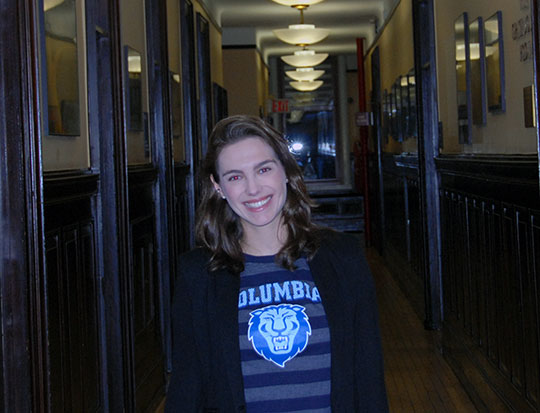Blazing a Trail for Brazilian Students
TC's first Lemann Fellow hopes to develop connections between schools, universities and the working world in her home country
TC's first Lemann Fellow hopes to connect schools, universities and the working world in her home country.
In Brazil, one of the world’s largest and most dynamic economies, the nascent field of professional coaching is so new—and so foreign to established practice—that there is no word for it in Portuguese.
“We use the English word ‘coaching,’” says Tonia de Souza Casarin, a master’s student at TC in Adult Learning and Leadership who launched her own freelance coaching practice in Rio de Janeiro a few years ago.
Casarin is the first TC student to receive a Lemann Fellowship, a program of Brazil’s Lemann Foundation, a major Brazilian educational philanthropy with strong ties to Columbia University. The foundation supports master’s studies for Brazilian students at Columbia’s graduate schools, endows the Lemann Center and Lemann Professorship in Brazilian studies, and collaborates with Columbia’s Global Center in Rio.
The foundation, which has worked in Brazil since 2002 to invest in education innovation, works with schools and local governments to strengthen leadership in public education. Its fellows and grantees, including scholarship recipients like Casarin, form a network of education leaders who are expected to return home to contribute.
Casarin considers herself a case study in how Brazilian education and professional development lag behind the country’s economic success. Career advising is minimal in high schools and universities, she says. Students pick fields with little information and even less support to create their own path. In particular, they lack tools to become good managers or leaders.
“I chose business,” Casarin said. “And I’m pretty sure that wasn’t the right choice for me.” The decision was all practical, she says: coming from a family of modest means in the city of Petropolis, she felt she needed to find a job and make money right away.
After earning her undergraduate business degree in 2007 from Rio’s Pontifícia Universidade Católica, Casarin worked for a telecommunications company and a consulting firm before taking a job developing a management program for a department of the Rio de Janeiro city government. “I was tired of selling cellphones to people who already had them,” she said. “I was trying to find meaning in my career.”
Earlier she had been mentored by a top executive at the telecommunications company, and the experience sparked an epiphany. “It was a transformative process,” she said. “I wanted to mentor people, too. I saved money and I got certified in coaching, by an American guy in Brazil. I started having my own clients. They were people in their first management role—I had a lot of lawyers who were now managers and had no idea how to do it.”
While working in local government, she continued her coaching practice after hours and on weekends. She still works with a few clients, holding sessions with them by Skype.
Casarin says she chose TC for its flexibility, resources and breadth of fields. “The view of education at TC is not just what happens in schools, but encompassing nutrition, health, sexuality and more. It was important for me to have a broad field.”
Among the early highlights of her jam-packed TC experience (she’s planning to complete the master’s degree in 12 months) are her classes with leadership and adult learning scholar Arthur M. Langer, and a workshop on emotional intelligence with Terence E. Maltbia, a leader in the coaching field.
By strengthening her foundation in social and emotional learning, Casarin hopes to return to Brazil ready not just to ramp up her coaching practice, but also to build the missing connections between schools, universities and the working world. Although adults have been her focus until now, she is keen to start working with teens in Brazil, where, she says, too many opportunities remain confined to the rich and connected.
Already she is trying to do her part with a video blog she is about to launch on Estudar Fora, a Lemann-supported resource for Brazilian students considering overseas studies. There she plans to share her experiences at TC and “break the mindset that studying abroad is only for the rich.”
“I’m just connecting the dots,” she said. “I want to help adolescents solidify their values in their transition phase. If you develop social and emotional learning, they can overcome obstacles even if the environment is unfavorable. And it will do them good all their lives.”
(Published 11/18/2013)
Published Monday, Nov. 18, 2013
